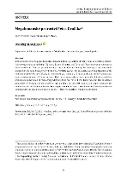Megalomanské proroctví Petra Druláka
( Petr Drulák’s megalomaniac prophecy )

Autor
Slačálek, Ondřej
Datum vydání
2023Publikováno v
Central European Journal of PoliticsRočník / Číslo vydání
8 (2)ISBN / ISSN
ISSN: 2464-479XInformace o financování
MSM/EF/EF16_019/0000734
Metadata
Zobrazit celý záznamKolekce
Tato publikace má vydavatelskou verzi s DOI 10.24132/cejop_2022_7
Abstrakt
V úvodu text identifikuje tři hlavní problémy: (1) excesivní tématická ambice, (2) rozpor obsahu a formy a (3) tendence ke schematismu a esencialiismu. Posléze článek ilustruje tyto formální problémy na šesti sporných bodech knihy Podvojný svět: (1) zcela polarizující popis rozporu mezi polyteismem a monoteismem, (2) důraz na naturalismus v jeho řešeních, (3) jednostranná koncepce Střední Evropy, (4) zcela schematický popis českých dějin, a (5) problematickou náhradu "democracie bez přívlastků" za liberální demokracii", aniž by zahrnula záruky svobod jako své nutné předpoklady. V šesté části článek diskutuje podobnosti a rozdíly mezi Drulákovou pozicí a fašismem. Docjhází k závěru, že Drulák má mnohem víc společného s českými "monoteistickými proroky" Masarykem a Havlem, než sám připouští.
In the introduction, the paper identifies three main formal problems of Petr Drulák as a political thinker: (1) excessive thematic ambition, (2) contradiction of content and form, and (3) a tendency to schematism and essentialism. Then the paper illustrates these formal shortcomings by pointing to six contentious moments in his book Podvojný svět [The Dual World]: (1) an overly polarizing depiction of the contradiction between polytheism and monotheism, (2) an emphasis on naturalism in his own solution, (3) a one-sided conception of Central Europe, (4) an overly schematizing depiction of Czech history, and (5) a problematic substitution of "democracy without adjectives" for a liberal democracy that fails to address guarantees of freedoms as its necessary preconditions. In the sixth section, the paper discusses the similarities and differences between Drulák's position and fascism. It concludes that Drulák has more in common with the Czech "monotheistic prophets" Masaryk and Havel than he would admit.
Klíčová slova
Petr Drulák, monoteismus, proroctví, Střední Evropa, T. G. Masaryk, iliberalismus, Nová Pravice
Petr Drulák, monotheism, prophecy, Central Europe, T. G. Masaryk, illiberalism, New Right
Trvalý odkaz
https://hdl.handle.net/20.500.14178/2876Licence
Licence pro užití plného textu výsledku: Creative Commons Uveďte původ-Neužívejte dílo komerčně-Nezpracovávejte 4.0 International

